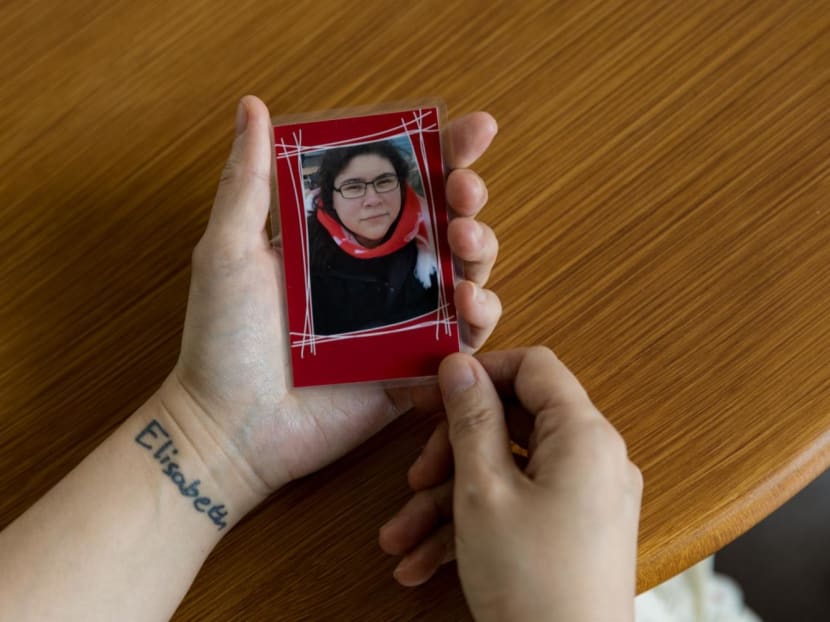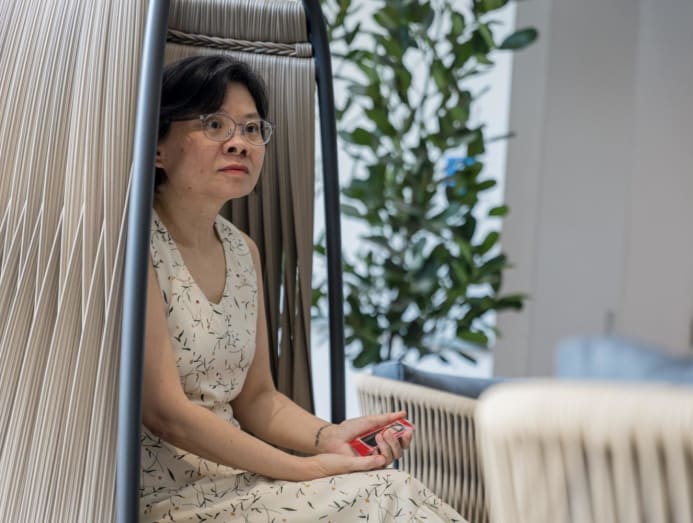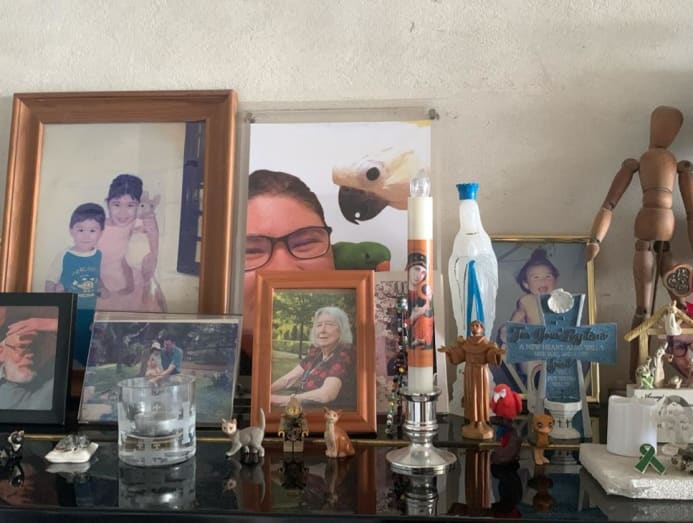The Stories Behind: This mum talks through tears of her daughter's suicide because the teen would 'want her to'

Mrs Liping Pauwels holding a photo of her daughter Elisabeth who died of suicide in 2019. She got a tattoo of her daughter’s name — in the teenager's handwriting — on her wrist six months after her daughter's death.
Warning: This article contains references to suicide.
SINGAPORE — In the midst of a crowded, hectic mall's foyer, an exhibition quietly raised mental health awareness by recreating the bedrooms of three young people who lost their lives to suicide.
I encountered The Rooms that Remain, held at Wisma Atria on Orchard Road in June, after hearing about the exhibition aimed at sparking meaningful conversations about suicide.
Viewing the exhibition, the sight of the soft toys, trinkets and other items left behind by these young persons left me speechless.
Not long afterwards, I was similarly at a loss for words during an interview when trying to broach the subject of her daughter’s suicide with Mrs Liping Pauwels, the mother of the late Elisabeth.
Elisabeth’s room was virtually replicated on the physical exhibit’s accompanying website, organised by mental health organisations Youthline and the PleaseStay Movement.
Sitting at a cafe in Holland Village near her home last month, I was navigating a tough conversation about suicide and the 50-year-old homemaker’s five-year journey with grief, which felt out of bounds.
Mrs Pauwels said of her daughter, who died in 2019 aged 18: “I can’t speak about her in past tense, I think most parents cannot.”

Over the course of an hour, Mrs Pauwels spoke warmly about Elisabeth, an animal lover who had rescued a frog and a rabbit. She also spoke candidly about the teen's struggle with schizo-affective disorder.
When I asked what inspired her to share about her journey with grief and her daughter’s mental health condition publicly through the exhibition, and now by speaking with TODAY, Mrs Pauwels was clear that it was “what my girl would want”.
“She told me, ‘Mummy, when I recover, I would like to help young people like me’, and so right now, I’m doing it on her behalf, and I want her story to be told.”
A MINI ZOOKEEPER
In Elisabeth’s exhibited room, which her mother said was “identical” to her room at home, were the tokens of her various interests, as well as the desk where she spent hours drawing.
On her wall was also a poster from a Japanese anime, which was an interest that Mrs Pauwels introduced to her daughter.
Elisabeth’s manga-style drawings were set among sketches of birds, a symbol of the teenager's dream of becoming a veterinarian some day.
“My home is like a mini zoo. Elisabeth has a very good connection with animals, they would come to her. She has five birds, parrots, three cats, all of which are adopted,” Mrs Pauwels said.
Elisabeth also fostered a dog, rescued a rabbit and “saved” a frog from an aquarium, which had been sold for S$5 as fish food.
Mrs Pauwels said that Elisabeth had been a cheerful and creative girl but she noticed that “something was amiss” when her daughter became more introverted in Secondary 2.
While she recognised the symptoms of a depressed mood, having faced post-natal depression herself, she said that Elisabeth’s eventual diagnosis of schizo-affective disorder was initially a mystery to her.
Schizo-affective disorder is a mental health condition characterised by a mix of symptoms of schizophrenia such as hallucinations, and mood disorder symptoms such as depression and mania.
In manic states, Elisabeth would stay up till the wee hours of the morning and engage in self-harm, as she imagined maggots on her skin and would sometimes bang her head against the wall.
The girl took a year's leave of absence from school as her “countless” hospital visits became disruptive, and Mrs Pauwels shared a room with her daughter as a full-time caregiver.
Contrary to what one might expect, the last two weeks of her life were marked by a sudden adrenaline rush with Elisabeth in her “most active” state, dressing up and putting on makeup to hang out with friends.
“She told me that she wanted to meet her friend at Star Vista (mall) and we went down (the housing block) together and she said she’d take a bus. She walked out of the lift and turned back and waved at me. That’s the last I saw her,” Mrs Pauwels said with tears in her eyes.
COPING WITH TABOO, GRIEF
As we paused the interview for Mrs Pauwels to collect herself, I rooted around in my bag for a tissue paper packet to hand to her, and to gather myself as well, because the confronting discussion had brought me close to tears.
“I was literally with her 24 hours (a day), so it felt like a bit of a betrayal by my girl. The day before (she ended her life), I hugged her and said, 'Don’t do that to me',” Mrs Pauwels said as she resumed her account of her daughter's life and death.
When I asked how she learnt to cope in the immediate aftermath, Mrs Pauwels said that she saw a psychologist once a week and sought comfort in a child bereavement support group who meets monthly.
She has also connected with the PleaseStay movement, led by parents of children lost to suicide who advocate for a national strategy to tackle youth suicide and promote mental well-being.
Her family, consisting of Mrs Pauwels, her Dutch husband and her two sons, now 12 and 20 years old, celebrate Elisabeth’s birthday every year with her favourite chocolate cake, and light a candle at home to remember her daily.
In memory of her, Mrs Pauwels continues to raise awareness on mental health struggles, especially among youth, for which her daughter had always advocated.
“She hates it when people think (of them) as 'crazy', the stigma and the way people think of mental health as something you can fix easily,” she said.
Mrs Pauwels noted that the Samaritans of Singapore's suicide statistics in July reported in 2023 that it had the lowest number of suicide deaths since 2000.
However, for the fifth consecutive year, suicide has persisted as the leading cause of death among young people aged 10 to 29.
This is one reason that she continues to speak openly about mental health conditions and suicide, despite this topic being taboo for many parents.
In response to TODAY’s queries, Mr Kevin Koh, deputy chairman of Youthline, a youth helpline that was one of the exhibition’s organisers, said that the event was created with the hope of raising awareness on suicide prevention among youth, who are “particularly vulnerable”.
The organisation collaborated with parents from the PleaseStay Movement and assured them that their stories would be handled sensitively, through honouring their children's lives and weaving messages of hope and mental health tips into their stories to encourage other young people.
Although it is a common misconception that openly discussing suicide will encourage a person to act on it, Mr Koh said that it is “much worse” if a young person has no one to talk to about their emotions.
“Fears shared openly are more likely to be addressed and reduced.
"Open conversation is important to understand the roots of any issue and to help prevent more loss,” he added.
Agreeing, Mrs Pauwels said that she has even encountered parents who are “in denial” about their children’s mental health struggles and thus refuse to seek professional help because they are hoping that it is an “accident”.
Then there are those who “jump to conclusions” about why her daughter struggled with mental health or had to be admitted into the Institute of Mental Health (IMH).
“They say, ‘It must be you, you must have put a lot of stress on your kid',” Mrs Pauwels recalled some “hurtful” comments that she has heard from friends.
However, among the memories that keep her motivated to speak out is one when Elisabeth was “very proud” of her, when she talked to the other girls who were in the same IMH ward and listened to their mental health struggles.
“The girls at the ward were quite impressed with me, and said that they wished their parents were as open to listen and accept who they are,” Mrs Pauwels added.
As for what she would like to say to other parents who may be initially speechless as I was, or have no idea where to start in tackling long-stigmatised subjects of suicide and mental health, she said that acceptance is a “good start” to healing.
“We are a society of comparison, but everyone of us is different.
"Your children might not turn out as you expected, but please accept them for who they are.”
WHERE TO SEEK HELP
If you, or anyone you know might want to talk to someone, you can reach out to one of the helplines below.
- Samaritans of Singapore: 1767 (call), 9151 1767 (WhatsApp / text) and over email at pat [at] sos.org.sg (pat[at]sos[dot]org[dot]sg).
- Youthline (for individuals up to 35 years old): +65 6436 6612 (call), +65 8533 9460 (text) and over email at hello [at] youthline.sg (hello[at]youthline[dot]sg).
- Touchline by Touch Community Services: 1800 377 2252
- Tinkle Friend (for primary school-aged children): 1800-274-4788









